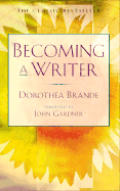 I think originality is the big carrot we writers chase. Even the ones who believe originality is a myth, even the ones who follow three-act formulae, we all want to find that THING. At least some secret part of us does.
I think originality is the big carrot we writers chase. Even the ones who believe originality is a myth, even the ones who follow three-act formulae, we all want to find that THING. At least some secret part of us does.Consider this solution, from Dorothea Brande's 1934 classic, BECOMING A WRITER, which I've just read for the first time:
When the pitfall of imitation is safely skirted, one often finds that in the effort to be original an author has pulled and jerked and prodded his story into monstrous form. He will plant dynamite at its crisis, turn the conclusion inside out, betray a character by making him act uncharacteristically, all in the service of the God of Originality.
...So these stories fail from their own inconsistency, although the author has at his command, in the mere exercise of stringent honesty, the best source of consistency for his own work. If you can discover what you truly believe about most of the major matters of life, you will be able to write a story which is honest and original and unique. But those are very large "ifs," and it takes hard digging to get at the roots of one's own convictions.
As writers' books go, Brande's falls into more the category of self-help than craft. But lately, I'm finding the self-help category more, well, helpful. I can read a million volumes on narrative shape or musical sentences or making dialogue real--and I enjoy reading these things--but I still have to teach myself to write. We all have to teach ourselves to write. It's like basketball--you might know you suck at freethrows, but the only way to get past that is to stand on the line and shoot. A lot. Identify fundamental weaknesses, sure, but talking about flaws actually fixes diddleysquat.
So I vote for Brande's brand of writing book, at least today I do, and the bulk of it focuses on methods of the "hard digging" she mentions above. She offers several familiar but tried-and-tested solutions: early morning writing to exploit the leftover dreamstate, harnessing the unconscious through meditation (this is pre-1960's mind you), timed daily writing, putting off rereading/revising, close analysis of others' work, rhythmic imitation of others' work, etc. She does NOT push for heavy critiquing/workshopping for beginners, as she finds it cripples more than it helps.
One of her approaches I tried and enjoyed this week: spending some time in a language-free world. No reading, no talk. (Of course, in 1934, this meant closing out far fewer distractions. She warns against the distraction of the telephone. If she only knew the explosion of verbal distractions we face today!) The idea of the exercise: if one doesn't read or hear talk, then the unconscious will bubble up with writing. She encourages walking, knitting, playing solitaire, and other meditative, repetitive physical activities during the text-free time. And during this time, one may think about writing, but one may not write.
For me, this works like a charm. Nothing like forbidding something to make it more attractive. Nothing like setting aside nonproductive time to make my brain more productive. Writing has been going very well this week, and I have a new excuse to knit and pet my new cat.
Highly recommend this book, if you haven't read it already. It's quick and instructive, and way ahead of its time.
No comments:
Post a Comment